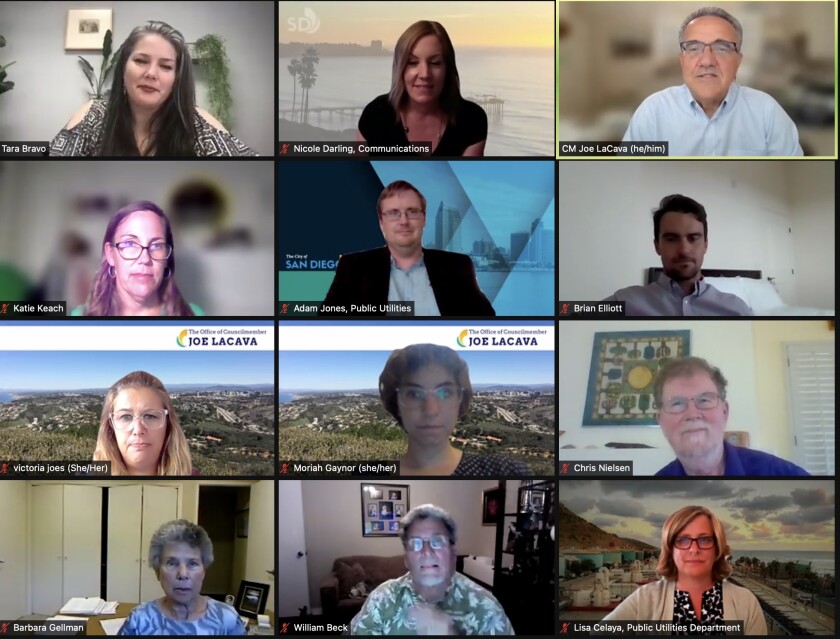Single-family residences in San Diego may see a sharp increase in their sewer rates starting Jan. 1, and ahead of a scheduled Sept. 21 City Council vote, area residents heard explanations for the proposed changes and asked questions during an Aug. 18 online forum presented by the city’s Public Utilities Department and Councilman Joe LaCava, whose District 1 includes La Jolla.
It was the second forum for District 1 residents to hear more information about the proposed sewer rate hikes. Additional forums were set for other council districts.
Single-family homes would see sewer rates rise about 17 percent starting in 2022, and a total of 31 percent through 2025. The proposed rate changes include an initial reduction in wastewater base fees.
A typical single-family homeowner would see the monthly bill increase from $40.52 this year to $47.64 on Jan. 1. The bill would then climb to $49.58 in January 2023, $51.53 in January 2024 and $53.07 in January 2025.
The city’s wastewater system is “massive,” according to Tara Bravo, vice president of CV Strategies, a communications firm hired by the city to facilitate community engagement about the rate proposal.
With more than 3,000 miles of sewer mains, the city produces 20 million gallons of recycled water per day, Bravo said. “It takes a lot to keep this kind of thing running,” she said.
An independent consultant determined that without a wastewater rate increase, the city would not have enough revenue to provide necessary wastewater and recycled water services starting in 2022, Bravo said.
“The rate increases for sewer will allow the city to continue upgrading core infrastructure, replacing aging sewer mains and pump stations, fund wastewater treatment and minimize or eliminate sewer spills,” LaCava said.
Bravo said the city has implemented cost-control measures such as seeking low-interest state and federal funding for the Pure Water project, the city’s purification system for turning recycled water into drinking water. The funding has saved ratepayers about $293 million, officials say.
Lisa Celaya, assistant director of the Public Utilities Department, said Pure Water will lead to rate increases, but “it does help us avoid more costly upgrades that we would need for secondary treatment.”
The city also has increased preventive maintenance to extend the useful life of its wastewater systems and has replaced and upgraded infrastructure to reduce pipeline leaks and breaks, Bravo said.

City representatives explain proposed sewer rate increases to City Council District 1 residents during an Aug. 18 online forum.
(Elisabeth Frausto)
Despite those measures, a rate increase is necessary next year because the “infrastructure is aging at a fairly substantial rate,” Bravo said. With a $14 million gap expected in 2022 between anticipated revenue and rising costs, and having had no rate increase in 10 years, “it’s urgent that it happens … now.”
The proposal would reduce sewer rates for most businesses, condominiums and apartments based on two studies indicating that those customers have been paying too much while those in single-family homes haven’t been paying enough.
“More of your wastewater cost increase will be reliant on the amount of water you’re using,” Bravo said.
She said the rate hikes and subsequent charges would cover only the actual costs of wastewater service, per Proposition 218, approved by California voters in 1996.
Prop. 218 also ensures that the charge for wastewater service is “distributed equitably among all ratepayers. … It means that you pay a very specific proportional cost to your demand on the system,” Bravo said.
Celaya said the rate increase is so steep the first year to “ensure proportionality. … The revenue we’re receiving from each customer class, whether or not that’s single-family, commercial or multifamily, has to be proportional to the use of our system or the cost that they’re incurring on that system.”
Those who need assistance paying their bills are encouraged to apply for the city’s bill assistance program, through which qualifying residential customers may receive a credit of up to $100 on their water and wastewater bill once per 12-month period.
“We’re very aware of the need to support our citizens at this time,” Bravo said.
LaCava said the Sept. 21 vote is “a decision that I’m not taking lightly.” He said the questions and comments he received during the forums and from other resident communications will aid his decision.
To watch the City Council’s public hearing at 2 p.m. Tuesday, Sept. 21, visit sandiego.zoomgov.com/j/1601405223.
Protests of the proposed rates must be submitted in writing before the end of the public hearing and must include the person’s name, service address and signature. Protests may be mailed to City Clerk, City Administration Building, 202 C St., MS 2A, San Diego, CA 92101. ◆
"hear" - Google News
August 21, 2021 at 05:33AM
https://ift.tt/3szj3UG
'It's urgent that it happens now': Local residents hear explanations for proposed city sewer rate increases - La Jolla Light
"hear" - Google News
https://ift.tt/2KTiH6k
https://ift.tt/2Wh3f9n
Bagikan Berita Ini














0 Response to "'It's urgent that it happens now': Local residents hear explanations for proposed city sewer rate increases - La Jolla Light"
Post a Comment